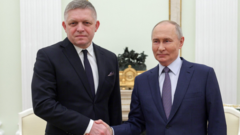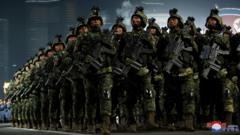In a notable move, the Biden administration has approved the shipment of American anti-personnel mines to Ukraine, aiming to enhance defenses against an increasingly aggressive Russian military strategy that relies heavily on foot soldiers. This strategic pivot comes as Defense Secretary Lloyd Austin disclosed the decision on Wednesday, marking it as a response to the faltering Ukrainian front lines in the eastern regions. The U.S. also recently permitted Ukraine to unleash longer-range missiles on Russian targets, a groundbreaking tactical escalation that occurred for the first time on Tuesday.
Biden Administers Support to Ukraine with Anti-Personnel Mines Amid Escalating Tensions

Biden Administers Support to Ukraine with Anti-Personnel Mines Amid Escalating Tensions
The U.S. decision to supply Ukraine with anti-personnel mines signals a shift in strategy amidst growing hostilities from Russia and changing battlefield dynamics.
According to Austin, the urgency for supplying mines arises from Russia's tactical adjustments, as they adapt to the conflict by deploying more infantry instead of relying solely on armored divisions. “They’ve asked for these, and so I think it’s a good idea,” he stated during his visit to Laos. This change unveils a dual layer of strategic concern; on one hand, it seeks to reinforce Ukraine’s defensive capabilities and, on the other, underscores the evolving dynamics of the war affecting U.S. decision-making.
The provision of the mines precedes notable shifts in U.S. foreign policy, particularly following the recent elections that reintroduce former President Donald J. Trump into the political landscape. While President Biden had previously been cautious about escalating support to Ukraine—mindful of not provoking Russian aggressiveness—administration officials now assert that the benefits of these military enhancements in Ukraine can outweigh the potential hazards of antagonizing Russia further.
The interplay of U.S. military support to Ukraine and Russian responses further complicates the geopolitical chessboard where heightened tensions signify perilous risks of escalation, including discussions of nuclear thresholds by Moscow. Thus, the ramifications of these actions, both immediate and long-term, may significantly alter the course of the ongoing conflict and the strategy of nations involved.
The provision of the mines precedes notable shifts in U.S. foreign policy, particularly following the recent elections that reintroduce former President Donald J. Trump into the political landscape. While President Biden had previously been cautious about escalating support to Ukraine—mindful of not provoking Russian aggressiveness—administration officials now assert that the benefits of these military enhancements in Ukraine can outweigh the potential hazards of antagonizing Russia further.
The interplay of U.S. military support to Ukraine and Russian responses further complicates the geopolitical chessboard where heightened tensions signify perilous risks of escalation, including discussions of nuclear thresholds by Moscow. Thus, the ramifications of these actions, both immediate and long-term, may significantly alter the course of the ongoing conflict and the strategy of nations involved.




















